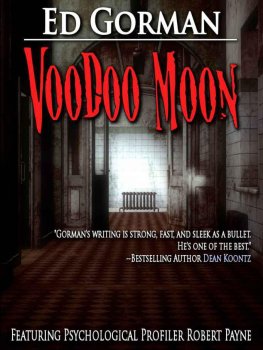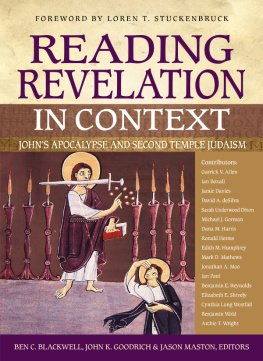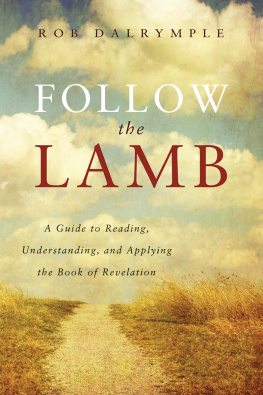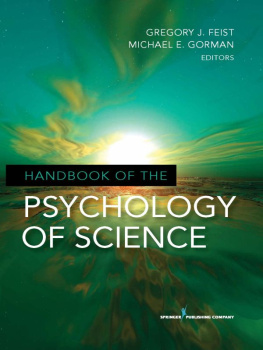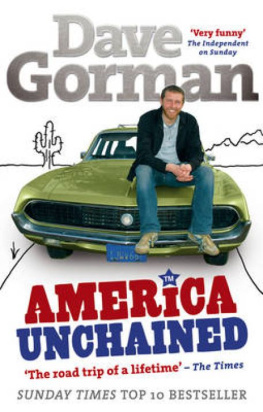Michael J. Gorman - Reading Revelation Responsibly
Here you can read online Michael J. Gorman - Reading Revelation Responsibly full text of the book (entire story) in english for free. Download pdf and epub, get meaning, cover and reviews about this ebook. year: 0, genre: Religion. Description of the work, (preface) as well as reviews are available. Best literature library LitArk.com created for fans of good reading and offers a wide selection of genres:
Romance novel
Science fiction
Adventure
Detective
Science
History
Home and family
Prose
Art
Politics
Computer
Non-fiction
Religion
Business
Children
Humor
Choose a favorite category and find really read worthwhile books. Enjoy immersion in the world of imagination, feel the emotions of the characters or learn something new for yourself, make an fascinating discovery.
- Book:Reading Revelation Responsibly
- Author:
- Genre:
- Year:0
- Rating:5 / 5
- Favourites:Add to favourites
- Your mark:
- 100
- 1
- 2
- 3
- 4
- 5
Reading Revelation Responsibly: summary, description and annotation
We offer to read an annotation, description, summary or preface (depends on what the author of the book "Reading Revelation Responsibly" wrote himself). If you haven't found the necessary information about the book — write in the comments, we will try to find it.
Reading Revelation Responsibly — read online for free the complete book (whole text) full work
Below is the text of the book, divided by pages. System saving the place of the last page read, allows you to conveniently read the book "Reading Revelation Responsibly" online for free, without having to search again every time where you left off. Put a bookmark, and you can go to the page where you finished reading at any time.
Font size:
Interval:
Bookmark:
reading revelation responsibly
reading
revelation
responsibly
Uncivil Worship and Witness:
Following the Lamb into the New Creation
Michael J. Gorman
CASCADE Books Eugene, Oregon
READING REVELATION RESPONSIBLY
Uncivil Worship and Witness: Following the Lamb into the New Creation
Copyright 2011 Michael J. Gorman. All rights reserved. Except for brief quotations in critical publications or reviews, no part of this book may be reproduced in any manner without prior written permission from the publisher. Write: Permissions, Wipf and Stock Publishers, 199 W. 8th Ave., Suite 3, Eugene, OR 97401.
Cascade Books
An Imprint of Wipf and Stock Publishers
199 W. 8th Ave., Suite 3
Eugene, OR 97401
www.wipfandstock.com
isbn 13: 978-1-60608-560-8
Lyrics from Paul Manzs Een So, Lord Jesus, Quickly Come copyright 1954, renewed 1982 by Concordia Publishing House, St. Louis, MO. Copyright assigned 1987 to Birnamwood Publications (ASCAP) a division of MorningStar Music Publishers, Inc., St. Louis, MO. Reprinted with permission.
New Revised Standard Version Bible, copyright 1989, Division of Christian Education of the National Council of the Churches of Christ in the United States of America. Used by permission. All rights reserved.
Cataloguing-in-Publication data:
Gorman, Michael J.
Reading Revelation responsibly : uncivil worship and witness : following the lamb into the new creation / Michael J. Gorman.
xviii + 212 p. ; 23 cm. Includes bibliographical references and indexes.
isbn 13: 978-1-60608-560-8
1. Bible. N.T. RevelationCriticism, interpretation, etc. I. Title.
bs2825.52 g55 2010
Manufactured in the U.S.A.
To my students of Revelation
at St. Marys Seminary & University in the School of Theology
and the Ecumenical Institute of Theology,
Duke Divinity School,
Community United Methodist Church,
and many other churches
Acknowledgments
There are many people to thank for their contributions to this book. I am grateful to Chris Spinks and Jim Tedrick at Cascade Books of Wipf and Stock Publishers for the invitation to write it. They are good friends and theological conversation partners as well as editors and publishers. I am also thankful for the privilege, many years ago, of studying Revelation with Bruce Metzger, and then assisting him in teaching it. I am very grateful to friends who read a portion of this manuscript and offered helpful comments: New Testament colleagues Andy Johnson and Nelson Kraybill; former student Jason Poling; current student and research assistant Kurt Pfund; and the students in my St. Marys Ecumenical Institute of Theology seminar The Book of Revelation and its Interpreters in June 2010. They read the entire book in draft form, giving both positive feedback and helpful critique. Thank you, Jaki Hall, Betty Kansler, Brian McLoughlin, and Tom Tasselmyer.
Of all those who saw the book in draft form, Kurt Pfund deserves my heartiest thanks. His careful attention to the books style, argument, and indexes improved it in myriad ways. I look forward to reading more of his own work one day, no doubt in published form.
I express my gratitude as well to other students, both academic and ecclesial, for their interest, questions, and contributions, especially those who have accompanied me on the five study tours to Turkey and Greece over the last decade. I also wish to mention the stimulating class of students I taught at Duke Divinity School while there as a visiting professor in the spring term of 2009.
I also gladly acknowledge my debt to many other interpreters of Revelation, above all Richard Bauckham, Eugene Peterson, and Christopher Rowland. Others who have influenced me significantly include David Aune, Alan Boesak, Ian Boxall, Wes Howard-Brook and Anthony Gwyther, Richard Hays, Craig Koester, Mitchell Reddish, Pablo Richard, Elizabeth Schssler-Fiorenza, and Ben Witherington, plus visual artists and musicians William Blake, Albrecht Drer, George Frideric Handel, Paul Manz, Pat Marvenko Smith, and many hymn writers.
I am grateful as well to my son Brian, who helped prepare the Scripture index. Finally, I thank my wife Nancy, who is always happy to talk about Revelation, and our long-term Friday night Bible study group, with whom we patiently walked through Revelation during the better part of a year. These wonderful friends have also endured many slide shows of places like Ephesus and Laodicea. (The photos in this book were all taken by the author.)
Sixth Sunday after Pentecost, 2010
Prelude:
Reading Revelation Responsibly
This book is for those who are confused by, afraid of, and/or preoccupied with the book of Revelation (not Revelation s plural). My aim is to help rescue it from those who either completely misinterpret it or completely ignore it. It is the product of twenty-five years of serious reading, reflecting, teaching, and traveling related to the Apocalypse, as Revelation is also known. This term is the English form of the first Greek word in the book, apokalypsis , meaning revelation. It does not mean destruction, end of the world, or anything similar.
This book is not a detailed commentary. It is rather a guide to reading Revelation in a responsible way and a theological engagement with the text, with chapters 14 stressing the former and chapters 510 the latter. Both for emphasis and for the benefit of those who do not read the entire book, the chapters deliberately repeat certain key points. The approach I take is hardly unique to me, at least in its broad strokes. But perhaps, nonetheless, a little self-revelation is in order.
Recently I read a Washington Post story about a 12-year-old boy whose favorite reading material was the kids version of the Left Behind books, an imaginative, dramatic, and sometimes violent account of the worlds last days and the return of Christ based on a particular way of reading Revelation and other biblical texts. My first reaction to that newspaper story was sharply critical: of authors who write such books, publishers who market them to children, parents and churches who purchase them, and even the youth who are enticed by them.
Then I recalled the Hal Lindsey era of my own 1970s youth. As a teen with a recently invigorated Christian faith, I too was briefly captivated by the hopesand fearsoutlined in The Late Great Planet Earth and similar books, the predecessors to the Left Behind phenomenon. Fortunately, our youth group was blessed with one leader who offered a different way of reading Revelation. My fears alleviated, I was able to put Revelation on the back burner through most of college, despite having a resident assistant who regularly camped out in the college woods to hone his survivalist skills before the Great Tribulation. (His preoccupation did, however, cause me considerable distress for a short period of time.)
My interest in Revelation resurfaced at Princeton Seminary, where I took a course on the book with the late, great professor Bruce Metzger, whose lectures became the basis for a popular book called Breaking the Code . Later, as a Ph.D. student, I helped him teach the same course. Thanks to Dr. Metzger, I developed a strong interest, not only in the book of Revelation itself, but also in the many ways it has been interpreted. When I in turn became a New Testament professor, I began regularly teaching a course called The Book of Revelation and its Interpreters. I also started giving talks on Revelation to church groups, college and seminary students, and others. And I began leading study tours called The Cities of Paul and John that include most of the seven citiesall located in modern Turkeyaddressed in Revelation.
While I was writing this book several other events provoked interest in the End. One was the election of US President Barack Obama. Almost immediately the blogosphere and airwaves were full of commentary suggesting that he could be the antichrist (a term that does not appear in Revelation He graciously responded in a way that was quite consonant with this book.
Font size:
Interval:
Bookmark:
Similar books «Reading Revelation Responsibly»
Look at similar books to Reading Revelation Responsibly. We have selected literature similar in name and meaning in the hope of providing readers with more options to find new, interesting, not yet read works.
Discussion, reviews of the book Reading Revelation Responsibly and just readers' own opinions. Leave your comments, write what you think about the work, its meaning or the main characters. Specify what exactly you liked and what you didn't like, and why you think so.

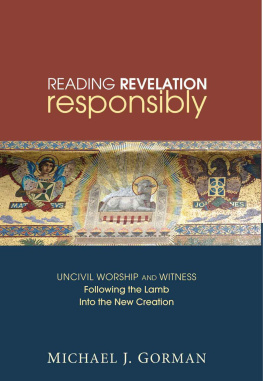
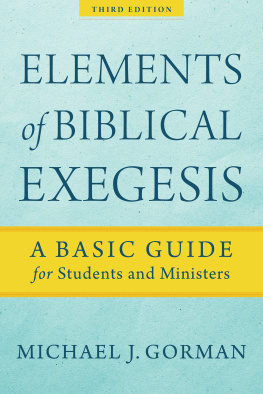
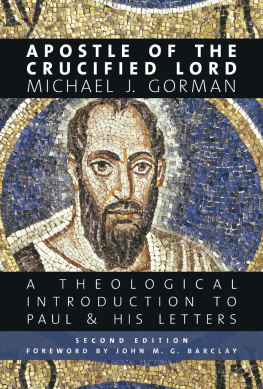
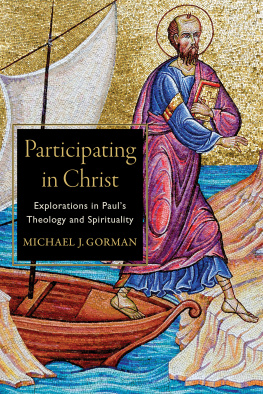

![Amanda Gorman - The Hill We Climb [calibre]](/uploads/posts/book/899455/thumbs/amanda-gorman-the-hill-we-climb-calibre.jpg)
